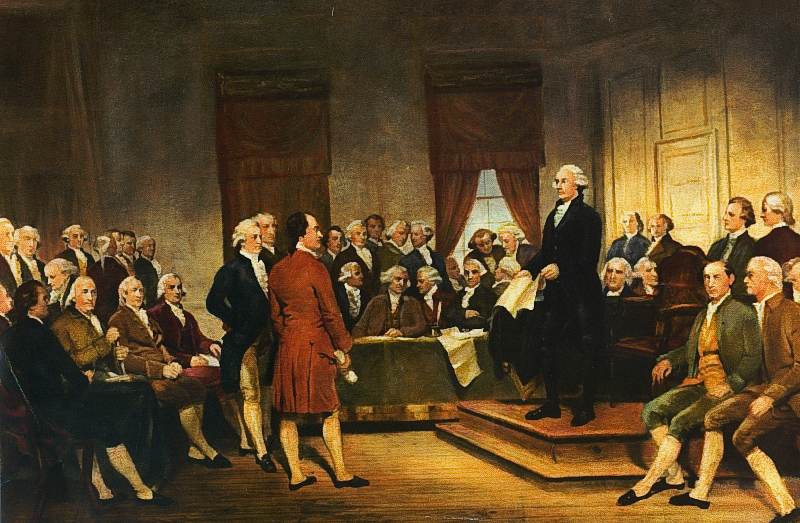Genealogy of Cuckery

The value of the Sohrab Ahmari-David French saga is in what’s unearthed by the reactions it kicks up.
Example: National Review Senior Editor Jay Nordlinger’s takeaway is “there’s nothing fancy or philosophical here: It’s just that David won’t bow to Trump and Trumpism, and that is what cannot be borne and must be punished.”
We (you) can argue about whether this is true. I’m interested in how people could possibly believe it. It is strange to see the idea expressed aloud that nothing philosophical is at stake in the political martyrdom of an unrepentantly principled politico.
Because the original idea behind Never Trumpism was that Trump was unprincipled, a “chaos candidate” who didn’t care about ideological integrity—who had no ideological integrity of his own. Now comes the meme that it is Trumpism which is dangerously principled, and French (in this case) who refuses to kneel before Zod. The details of whatever Frenchism might be are secondary—possibly irrelevant. What matters is here he stands; he can do no other.
In the online era, there is something immensely inevitable-feeling about this revaluation of values. The response on the part of Never Trumpers to the charge of cuckery becomes something intended to occur to those leveling the charge as Cuck Pride. This deeply conforms to the pattern of “the discourse.” Online identity politics means alchemically converting flung poo into precious gold.
You’ll recall the name for the alchemists’ substance that achieves this kind of transition: the philosopher’s stone—the legendary “elixir of life” epitomizing the transcendent bliss of pure and total knowledge. Martyrdom is morality: defeat is life. What could be a more perfect drug?
Beyond “Slave Morality”
Nordlinger and company would surely object that just as French is no cuck, he is also no martyr. He doesn’t give up, he fights—by the rules, whatever they be! A spirited gentleman willing to risk losing with personal honor, even if the honor of the system has failed!
Your mileage may vary. The reason the seemingly minor and ginned-up French controversy keeps expanding is it reaches straight down to the root of foundational questions about the relation between Christian and pagan virtue in the west.
Nietzsche’s most dangerous attack was on Christianity as a death wish, as an elevation of death so total that it put a lifetime of abject servility—a living “death to the world”—even above prompt extinction.
But it’s interesting to consider that Nietzsche’s complex and difficult relations with women led him to a place where, by the end of his life, he had not explored the connection between his theory of the deadly servility of the Christian with the deadly servility of the cuckold. Nietzsche’s attack on Christianity is notably desexualized.
Today that theme is, thanks to the internet, inescapable. It is baked into reality. Today it is a fault that “the shame is part of the kink” doesn’t appear in Nietzsche’s genealogy of morals. He won’t quite “go there” in his probes of the psychological imperative to convert erotic urges into ethical principles that defines so much of contemporary life. Our contemporary sexual psychology now leads key critics of French-style defenses of “muh principles” to trace the genealogy of today’s worship of procedural liberalism not to “slave morality,” as Nietzsche would have it, but to “cuck morality:”
Yes, another man should take my wife, I should go live in the shed, it is right, it is moral, it is justice… To live rightly, I must prevent posterity from being identical with me …
Nietzsche doesn’t use the pathos of that kind of “conversion experience” as a precise metaphor or emblem for the kind of willed abasement that so many right-wing critics of liberal proceduralism-worship put central. It is weird that so little has been written about how and why cuckoldry welled up from the depths of online to become the precision-targeted trope that it is, selected out of the sense that none other would be more accurate or suffice instead.
Of course Christianity and cuckoldry are not good metaphors for each other. No good Christian can embrace cuckoldry. But the charge of cuckery, leveled against Christians like French, has to do with the perceived untenableness today of staking out a middle position between the Benedict Option of evacuating from fronts collapsing in the culture war and the yet-to-be-named option of reasserting powerful constitutional authority for localities to resist and reject colonization by the revolutionary vanguard of institutionalized wokeness.
Because there is just no question that the aim of that institutional vanguard is to choke off America’s production of a certain kind of adult male and the architecture of social order that radiates upward from him toward the heights of authority. This project is out in the open and the reams of academic and ideological writing about its details and justifications are widely available.
The metaphor of cuckoldry is selected to the exclusion of all others because nothing else quite as effectively sharpens the charge that your obsession with the details of honor and principle has in fact become fatally abstract: you are being kicked out of your own house by a rival power actively working to take away everything that is yours, your children included. You are becoming the end of your line, forever, in every respect. Yet you won’t even evacuate from your breached defenses before it’s too late. Only the heights of spiritual snobbery can explain such a choice.
From Whence the Cuck?
This is obviously a harsh critique: why do so many people believe it is justified—is necessary? Nordlinger and company are, I think, sincere in their conviction that the answer is ideological. The Trumpy folk running amok yelling cuck do so out of an imperative just as “principled,” only debasedly so, as the conservative imperatives they deride with “muh principles” jokes. The Nordlingerians do not grasp that the rise of the cuck charge is the product of changes in our social and psychological environment that supervene upon, and are independent of, ideological phenomena.
One account of those changes might be that porn, which after all is possibly the most popular form of social media, is now everywhere, and this is why the attacks are cuck this and cuck that.
Another, and I think more sophisticated account, is that while porn has an influence it is mere content, and the context wherein that content swims, as do we all, is our new digital environment. In that environment, the primacy of human imagination as the driver of institutional and elite rule is being totally replaced with the primacy of machine memory.
In this new milieu, social order is being forcibly rearchitected away from the procedural liberal elite that mastered the globalized West through its expertise in broadcasting ethical memes. One consequence of this painful dislocating shift is an upsurge in populism and nationalism. But another is a panicked evac on the Left from the collapsing front of procedural liberalism—into what are thought to be the hardened sites of extreme institutionalized revolutionary wokeness.
The irony—an alarming one, to most populists and nationalists on the Right—is that so many “principled conservatives” reject all evidence that this is happening and, as a consequence of their profound ideological denial, falsely believe that procedural liberalism is tenable in its own right. They conceive of procedural liberalism as a stronghold wherein their way of life can be sheltered without having either to abandon their position or their conceptual apparatus.
French put the idea perfectly in his last exchange with Ahmari: “The only way this place survives as a united country is if we apply eighteenth-century solutions to this twenty-first century division.”
The painful fact is that from the standpoint of someone who understands what digital really is and what it is really doing, this talk evinces a complete failure to comprehend the nature of the new reality unfolding around us. “Rediscover the First Amendment,” French implored. “Rediscover religious freedom.” All as the bombed-out fort of procedural liberalism is being abandoned en masse by Leftist refugees seeking shelter—however foredoomed—in a postliberal cult from which, because it is not quite a religion, the First Amendment cannot protect us.
Deep America
Without doubt, the digital age throws America into a difficult position. This alien invasion of invisible robots our technologists have touched off makes us feel as if our own creation has betrayed us, because the order of machine memory obsolesces the whole social structure of imagineering that first twinkled into being during the Enlightenment and really took off with the advent of electricity. Even more disorienting, it hauls back patterns of living that haven’t held sway since the last time recorded memory ruled the West’s psychological and sociological milieu—the middle ages. In most respects, “eighteenth-century solutions” is now an oxymoron.
There is, however, some good news. Despite America’s modernist bona fides, as the 1619 Project somewhat inadvertently reminds us, the roots of our social and psychological order do extend, more or less seamlessly, back farther than we think. Medieval perceptions and sensibilities, such as the identification of “the liberal” with the unity of grammar, rhetoric, and dialectic, have not been zapped away from our collective inheritance. The fundamental divide between us incarnate human creatures and the disincarnate, animate-yet-not-alive bots does point us back toward anthropologies of justice that bridge the Middle Ages and early modernity.
These resources indicate that the political philosophy of statecraft first put to work in America by the Founders does offer an alternative to both “evac” and “cuck.” But only if more Americans begin to accept that our new digital world takes many “conserved” principles and strategies off the table.
The American Mind presents a range of perspectives. Views are writers’ own and do not necessarily represent those of The Claremont Institute.
The American Mind is a publication of the Claremont Institute, a non-profit 501(c)(3) organization, dedicated to restoring the principles of the American Founding to their rightful, preeminent authority in our national life. Interested in supporting our work? Gifts to the Claremont Institute are tax-deductible.
Root, root, root for the electors. If they don't win it's a shame.
Part I: Unfettered reason cannot conserve anything.






